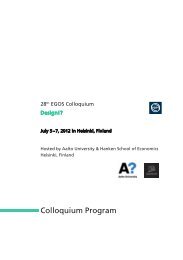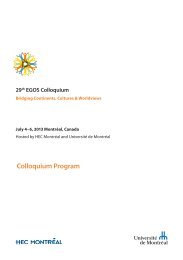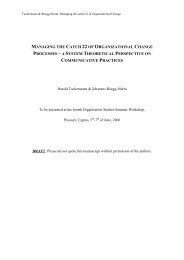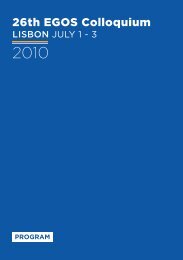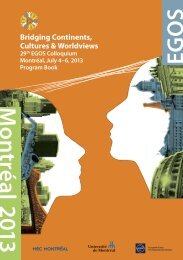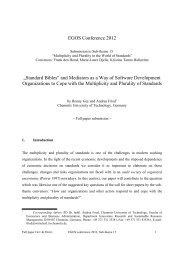A single set of standards and the multiplicity of interpretations - EGOS
A single set of standards and the multiplicity of interpretations - EGOS
A single set of standards and the multiplicity of interpretations - EGOS
You also want an ePaper? Increase the reach of your titles
YUMPU automatically turns print PDFs into web optimized ePapers that Google loves.
translations, <strong>the</strong> st<strong>and</strong>ard-<strong>set</strong>ter International Accounting St<strong>and</strong>ards Board (IASB) also provides<br />
for certain languages what IASB regards as <strong>of</strong>ficial translations. These IASB translations have<br />
been prepared in accordance with a particular process including a review <strong>of</strong> <strong>the</strong> translated text by<br />
a committee <strong>of</strong> accounting experts who represent certain constituent groups. On <strong>the</strong> contrary, <strong>the</strong><br />
EU translations <strong>of</strong> accounting <strong>st<strong>and</strong>ards</strong> are not reviewed by people who have accounting<br />
expertise when <strong>the</strong> <strong>st<strong>and</strong>ards</strong> are translated by translation services <strong>of</strong> EC. As a consequence <strong>of</strong> <strong>the</strong><br />
differing translation policies <strong>of</strong> EU <strong>and</strong> IASB, in some languages (such as French) multiple<br />
translations exist. Fur<strong>the</strong>rmore, <strong>the</strong> translation activities have taken place in a fluid <strong>set</strong>ting, <strong>and</strong><br />
IASB has at times coordinated also <strong>the</strong> production <strong>of</strong> <strong>the</strong> <strong>of</strong>ficial EU translations, which is no<br />
longer <strong>the</strong> case, <strong>and</strong> various actors’ participation in <strong>and</strong> influence on <strong>the</strong> translation has shifted<br />
over time.<br />
The way translation processes <strong>and</strong> procedures are organized is particular importance also within<br />
<strong>the</strong> context <strong>of</strong> regulation as previous literature in <strong>the</strong> academic field <strong>of</strong> translation studies<br />
acknowledges <strong>the</strong> limitations <strong>of</strong> translation: a translation can very rarely both render <strong>the</strong> original<br />
text word-for-word in ano<strong>the</strong>r language <strong>and</strong> convey its meaning unchanged (e.g. Nida 1964,<br />
Catford 1978, Chesterman 2000) <strong>and</strong> translation involves trade-<strong>of</strong>f between different dimensions<br />
equivalence. Both academic <strong>and</strong> pr<strong>of</strong>essional accountants have expressed concerns about <strong>the</strong><br />
adequacy <strong>and</strong> readability <strong>of</strong> <strong>the</strong> translated IFRS (Nobes 2006, Zeff 2007, Evans, Baskerville &<br />
Nara 2011, Hellmann, Perera & Patel 2010a & 2010b, http://www.worldbank.org) <strong>and</strong> some<br />
member states have complained to EU about <strong>the</strong> quality 12 <strong>of</strong> some translations <strong>of</strong> IFRS <strong>st<strong>and</strong>ards</strong><br />
( http://eur-lex.europa.eu). While <strong>the</strong> problems <strong>of</strong> translating accounting texts in general <strong>and</strong><br />
IFRSs in particular have raised concerns among various stakeholders, few academic studies have<br />
addressed translation in <strong>the</strong> context <strong>of</strong> accounting harmonization (Evans 2004, Evans, Baskerville<br />
& Nara 2012, Evans & Baskerville 2011,Dalhgren & Nilsson 2012). However, <strong>the</strong>se authors do<br />
not elaborate on how accounting regulations are translated.<br />
1 For a well-known model for <strong>the</strong> assessment <strong>of</strong> translation quality, see House (1997, 2006).<br />
2 Also some documented evidence exists that certain translations <strong>of</strong> IFRS have been directly misleading: E.g both<br />
“<strong>the</strong> statement <strong>of</strong> comprehensive income” <strong>and</strong> “pr<strong>of</strong>it <strong>and</strong> loss” where translated in <strong>the</strong> EU endorsed translation to<br />
Swedish as “rapport över totalresultat”. Consequently, <strong>the</strong> items which according to <strong>the</strong> English original were to<br />
presented in “pr<strong>of</strong>it <strong>and</strong> loss” could according to <strong>the</strong> Swedish translation be presented in “rapport över totalresultat”,<br />
thus ei<strong>the</strong>r in pr<strong>of</strong>it <strong>and</strong> loss or o<strong>the</strong>r comprehensive income (www.farforlag.se).<br />
3



